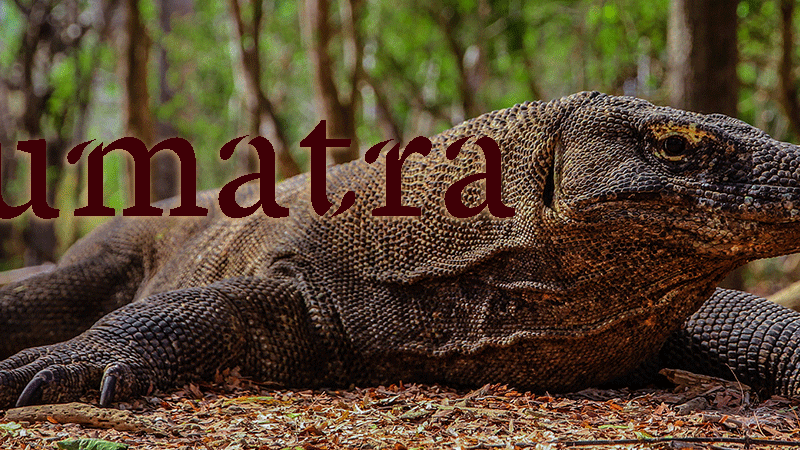16,000 Volcanic Islands
Coffee from Sumatra
Sumatra is the second-largest island in the Republic of Indonesia and the sixth-largest in the world.
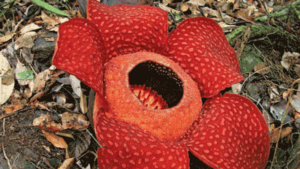 It is one of the few homes of the komodo dragon and also grows Rafflesia arnoldii, the Corpse flower, with its three-foot diameter and awful stench, and Amorphophallus titanum, the Monster flower, often 10 feet high, which, together, vie for the title of “largest flower in the world.”
It is one of the few homes of the komodo dragon and also grows Rafflesia arnoldii, the Corpse flower, with its three-foot diameter and awful stench, and Amorphophallus titanum, the Monster flower, often 10 feet high, which, together, vie for the title of “largest flower in the world.”
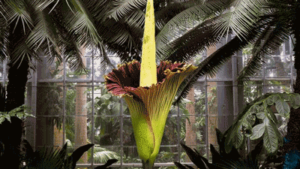 Sumatra is among the top ten coffee producers worldwide, growing uncommonly excellent coffee.
Sumatra is among the top ten coffee producers worldwide, growing uncommonly excellent coffee.
In the late 1600s, in an explicit effort to break the Arabic monopoly of coffee cultivation, Dutch traders smuggled Coffee arabica seedlings into Indonesia from Yemen, a gift from the governor of Malabar, India, to the governor of Batavia, now Jakarta. Batavia promptly fell victim to devastating floods.
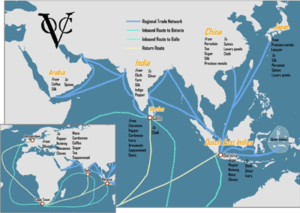 Three years later, a second shipment of seedlings arrived, were planted, and thrived. In a mere twelve years, the Dutch East India Company exported Sumatra coffee to Europe. It soon dominated the European coffee market.
Three years later, a second shipment of seedlings arrived, were planted, and thrived. In a mere twelve years, the Dutch East India Company exported Sumatra coffee to Europe. It soon dominated the European coffee market.
Properly processed and roasted, fine Indonesian coffees develop a complex and uniquely Indonesian flavor profile that includes rich, velvety mouthfeel, earthy tones, and a long-developing taste that begins with almond and dark chocolate and finishes with lemongrass overtones, all in the context of balanced body and low acidity.
Most Sumatra coffee grows at high altitude in rich volcanic ash soil and amid fertile old-growth forests. Ninety percent comes from smallholds – often organized into co-ops to better connect with buyers and to share equipment, education, and manpower – that still use traditional agricultural techniques.
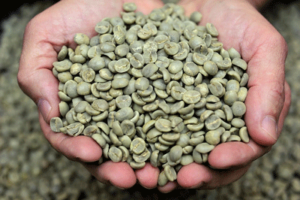 Since Indonesia’s climate is extremely wet, it is not surprising that many of its coffee crops are processed differently from coffees grown elsewhere. A time-honored wet-hulling method known as giling basah or semi-washing involves three stages of drying. Farmers remove only some of the mucilage and leave beans to ferment and begin drying. They remove the remaining mucilage and parchment and continue drying, allowing the still-moist beans to absorb flavors from the drying surface. Semi-processed beans sometimes are left to complete their drying during transport, yielding earthy flavor overtones. The unroasted beans are beautiful: deep blue-green similar to jade. High-quality beans so produced, as is the June Coffee of the Month, blossom into an outstanding and well-textured cup of coffee.
Since Indonesia’s climate is extremely wet, it is not surprising that many of its coffee crops are processed differently from coffees grown elsewhere. A time-honored wet-hulling method known as giling basah or semi-washing involves three stages of drying. Farmers remove only some of the mucilage and leave beans to ferment and begin drying. They remove the remaining mucilage and parchment and continue drying, allowing the still-moist beans to absorb flavors from the drying surface. Semi-processed beans sometimes are left to complete their drying during transport, yielding earthy flavor overtones. The unroasted beans are beautiful: deep blue-green similar to jade. High-quality beans so produced, as is the June Coffee of the Month, blossom into an outstanding and well-textured cup of coffee.
Nicole Sauce is proud to offer Sumatra coffee this month. She packs it with the usual careful custom roasting and in the spirit of Indonesia’s national motto: “Bhinneka tunggal ika,” (Unity in diversity):
Rwâneka dhâtu winuwus Buddha Wiswa,
Bhinnêki rakwa ring apan kena parwanosen,
Mangka ng Jinatwa kalawan Siwatatwa tunggal,
Bhinnêka tunggal ika tan hana dharma mangrwa.
Old Javanese poem by Kakawin Sutasoma
Canto 139, stanza 5
It is said that the well-known Buddha and Shiva are two different substances.
They are indeed different, yet how is it possible to recognise their difference in a glance,
since the truth of Jina (Buddha) and the truth of Shiva is one.
They are indeed different, but they are of the same kind, as there is no duality in Truth.
Critical text edition by Soewito Santoso


